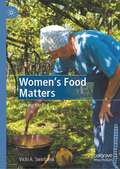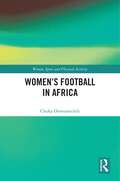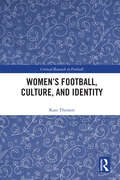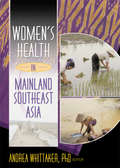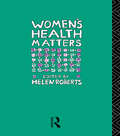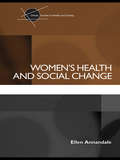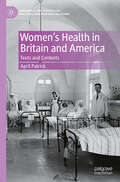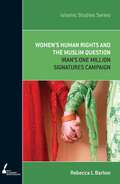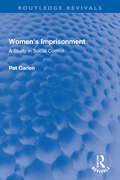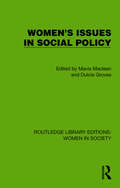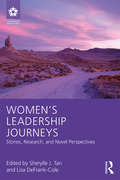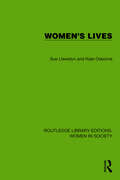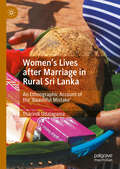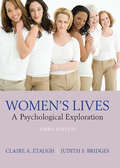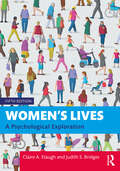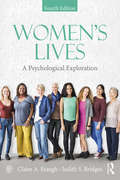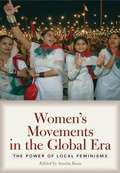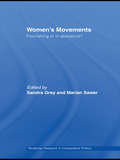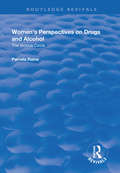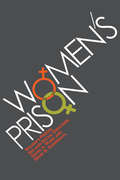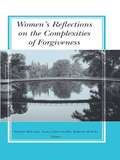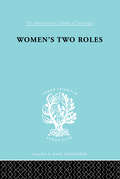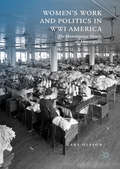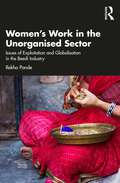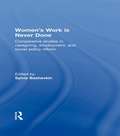- Table View
- List View
Women's Food Matters: Stirring the Pot
by Vicki A. SwinbankWomen have always been inextricably linked to food, especially in its production and preparation. This link, which applies cross-culturally, has seldom been fully acknowledged or celebrated. The role of women in this is usually taken for granted and therefore often rendered unimportant or invisible. This book presents a wide-ranging, interdiscplinary and comprehensive feminist analysis of women’s central role in many aspects of the world’s food systems and cultures. This central role is examined through a range of lenses, namely cross-cultural, intergenerational, and socially diverse.
Women's Football in Africa (ISSN)
by Chuka OnwumechiliThis is the first book to take an in-depth look at women’s football in Africa. Exploring the history, contemporary landscape, and future development of the women’s game on the African continent, this book offers an important new perspective on the rise of women’s sport more broadly. This book traces the history of women’s soccer in Africa from its introduction during the period of European colonization and its subsequent ban by colonial authorities, through to the present day period of rapidly increasing spectatorship, rising participation rates, and growing media interest. It reflects on the social obstacles to girls’ participation, including sociocultural and religious barriers, as well as important social issues in football such as homophobia, discrimination, and abuse, and considers why certain countries have dominated African competitions, including Nigeria, Ghana, and, lately, South Africa, Equitorial Guinea, and Cameroon. This book also examines the crucial role played by youth academies, and FIFA’s leadership role, and considers the challenges faced by African players, clubs, and countries on the global stage. This is fascinating reading for anybody with an interest in football, sport history, women’s sport, Africa, development studies, or the relationships between sport and wider society.
Women's Football, Culture, and Identity (Critical Research in Football)
by Kate ThemenThis book examines the experiences of amateur players in women’s football, challenging conventional discourses that centre male, masculine, and heterosexual identities and offering a new narrative that re-positions women’s voices.Based on original empirical research, including extended interviews with female players, the book outlines current debates in women’s football around gender, identity, and intersectionality. It explores football as a space of contestation, examining the creative ways in which women have negotiated opportunities to play football and the friendships and sociality that emerge from playing the game. The book examines resistance to historically bound cultural norms that privileges men’s participation, reflecting on mixed-sex football, femininity, embodiment, physical capital, and authenticity, and considers how this deeper understanding of football cultures might help in the future development of the women’s game.This is fascinating reading for anybody with an interest in football, women’s sport, the sociology of sport, or gender studies.
Women's Health In Mainland Southeast Asia
by Andrea WhittakerA thought-provoking look at women’s health in developing nations! This book shows how war, military regimes, industrialization, urbanization, and social upheaval have all affected the choices Southeast Asian women make about their health and health care. When you read these first-person accounts from Thailand, Cambodia, Vietnam, and Burma, you’ll be drawn into the lives of women dealing with drastic changes in their societies. The meticulous case studies in this book examine how social, cultural, and economic forces contribute to the way women make personal health care decisions. Women’s Health in Mainland Southeast Asia offers a thought-provoking look into the lives of women in this developing part of the world. Topics addressed in Women’s Health in Mainland Southeast Asia include: a proposed new approach to women’s health, where treatment is determined by society, culture, and gender rather than by biology alone the relationship between menstruation and other aspects of life for Burmese women the politics of abortion in Thailand the difficulties of seeking care for reproductive tract infections in Vietnam the influence of local culture on the treatment of reproductive health problems in northeast Thailand occupational health hazards faced by women working in the electronics industry in northern Thailand the links between migration, sex work, and HIV/AIDS among female garment factory workers in Cambodia
Women's Health Matters
by Helen RobertsWomen's Health Matters, like its sister volume Women's Health Counts, is an invaluable practical guide to doing feminist research on women's health. Written by experienced researchers and practitioners, these lively accounts of research work range from getting the research idea, through obtaining the funding and doing the research, to the practical problems faced, and eventual publication. The book provides an ideal antidote to textbooks and manuals, giving the reader a taste of the problems and pleasures of doing real research.
Women's Health and Social Change (Critical Studies in Health and Society)
by Ellen AnnandaleShortlisted for the BSA Sociology of Health and Illness Book Prize 2009 Traditional distinctions between the experiences of women and men are breaking down and being reconfigured in new, more complex ways. The long-established life expectancy gap between men and women appears to be closing in many affluent societies. Many men appear to be far more ‘body and health conscious’ than they ever were in the past and there are perceptible changes in women’s ‘health behaviours’, such as increases in cigarette smoking and alcohol consumption. Ellen Annandale provides a comprehensive and persuasive analysis of the contemporary social relations of gender and women’s health, arguing that the once all important sex/gender distinction fosters an undue separation between the social and the biological whereas it is their interaction and flexibility that is important in the production of health and illness. New theoretical tools are needed in a world where the meaning and lived experience of biological sex and of social gender, as well as the connections between them, are far more fluid. This book takes a step forward, outlining what an adequate feminist analysis of women’s health might look like. Women’s Health and Social Change will be of interest to academics and students working in sociology, women’s studies, gender studies, social medicine, social policy, nursing and midwifery.
Women's Health in Britain and America: Texts and Contexts (Humanities and Healthcare: Practical and Pedagogical Guides)
by April PatrickWomen’s Health in Britain and America: Texts and Contexts offers an unparalleled record of women’s health in the United Kingdom and the United States since 1750. Through chapters on pregnancy and childbirth, contraception and abortion, and breast and gynecological cancers, today’s readers can better understand historical precedents for contemporary issues. Introductory overviews present context about the history of medical care for women, such as diagnosis and treatment of specific conditions, medical advances, social and political contexts, and the effects of these on their lived experiences. The book presents a collection of primary texts including archival memoirs, letters, and diaries as well as published fiction, poetry, and medical advice. Women’s Health in Britain and America provides the necessary background for those new to the subject while also offering unique texts that will engage those already immersed in the field. As the political and social discussions around women’s bodies become more contentious and consequential, the history and the multiplicity of voices presented on these pages are more important than ever.
Women's Human Rights and the Muslim Question: Iran's One Million Signatures Campaign (Islamic Studies Series)
by Rebecca BarlowWomen's Human Rights and the Muslim Question shows how Muslim women have made meaningful contributions to the development of the international framework on gender equality and women's rights. An investigation into the women's movement of Iran offers a practical grounding for this argument, and presents unprecedented findings on how ideological divisions along secular and religious lines have been worked in favour of a rights-based framework for change.The book presents a comprehensive synthesis and analysis of the campaign material of the women's movement 'Change for Equality Campaign'—one of the most progressive and sophisticated movements in the Middle East/Central Asia. Islamic Studies Series - Volume 11
Women's Imprisonment: A Study in Social Control (Routledge Revivals)
by Pat CarlenFirst published in 1983, Women’s Imprisonment explores the meanings of women’s imprisonment and, in particular, the wider meanings of the ‘moment’ of prison. Based on officially sponsored research in Cornton Vale, Scotland’s only women’s prison, the book makes extensive use of interviews with sheriffs, policemen, and social workers, as well as observation in the prisons, the courts, and the lodging-houses. The author quotes from interviews with women recidivist prisoners, the judges who send them to prison, and the agencies which assist them in between their periods of imprisonment. In doing so, questions are raised about the meanings of imprisonment and the penal disciplining of women at the time of original publication. The book also examines the changing and various meanings of imprisonment in general and the invisible nature of the social control of women in particular.
Women's Issues in Social Policy (Routledge Library Editions: Women in Society)
by Mavis Maclean Dulcie GrovesDuring the 1980s a notable development in mainstream social policy in the United Kingdom was the emergence of a feminist critique. Originally published in 1991, Women’s Issues in Social Policy was intended as a contribution to the social policy literature which could also be used in a women’s studies context. It demonstrates the impossibility of understanding the welfare state without appreciating how it treats women, especially as dependants within the family, and the conflicts of interest between men and women as well as the unequal power relationships in the welfare context. It also highlights the fact that women’s traditional role in welfare provision is as unpaid carers for children, the elderly and incapacitated people, and is particularly concerned with the everyday experiences and dissatisfactions of women which had largely been ignored within mainstream social policy research and literature at the time.Women’s Issues in Social Policy incorporates recent research findings written from a feminist perspective and reveals the breadth and depth of recent work in previously unexplored areas such as time budgeting and transport, as well as developing analysis in traditional areas of interest such as health and personal care.The editors also looked into the wider European context and included a chapter which examines whether the abortion issue would give birth to feminism in Poland.Women’s Issues in Social Policy will be of value to teachers and students of social policy and women’s studies, as well as of interest to the general reader.
Women's Leadership Journeys: Stories, Research, and Novel Perspectives (Leadership: Research and Practice)
by Sherylle J. Tan Lisa DeFrank-ColeThis volume brings together research from leading scholars with stories from women leaders in diverse sectors to provide insights from their leadership journeys. The book begins with personal stories of women’s leadership journeys by chief executive officers, a former U.S. ambassador, a college president, and others. The stories enable readers to make sense of their own leadership journeys by learning about the varied paths to leadership and taking note of key elements such as role transitions, defining moments, identity development, and growth mindsets. Next, scholars discuss novel research that can guide women in navigating their journeys to leadership, including on followership, competition, representation of women in politics, and the role of biology in leadership. This must-have volume offers cutting-edge perspectives and a guide for women to navigate their own journeys to impactful leadership.
Women's Lives (Routledge Library Editions: Women in Society)
by Kate Osborne Sue LlewelynWhat are the patterns dominating women’s lives today? What are the issues which confront women in their relationships, their work, and their families? From adolescence and adult partnerships, through motherhood, to growing old Women’s Lives, originally published in 1990, explores themes which are central to women’s experience, focusing on areas such as growing up, women on their own, sexuality, bringing up children, and family relationships. Sue Llewelyn and Kate Osborne argue that a multi-faceted approach is needed to understand a woman’s life, taking in not only her personal psychology but also the social context in which she lives. The authors are both clinical psychologists with an interest in psychotherapy, and they draw on their own direct experience of working with women in distress, as well as on feminist writing, novels, and autobiographies to illustrate their arguments. Each chapter presents a detailed case history, highlighting an important aspect of women’s lives, and demonstrates the increased understanding to be gained from a combined approach using social psychology, feminist ideas, and psychodynamic insights.Designed for a wide readership, including psychologists, doctors, social workers, counsellors, and nurses, Women’s Lives will also be of great value to people on women’s studies courses and to those seeking a greater understanding of themselves or others.
Women's Lives after Marriage in Rural Sri Lanka: An Ethnographic Account of the ‘Beautiful Mistake'
by Tharindi UdalagamaDrawing on extensive research from a 14-month ethnographic study, this book delves into the intricate lives of married women in a rural Sinhala village in Sri Lanka. It explores their efforts to uphold community expectations while employing innovative and strategic approaches to navigate ruptures within their marital journeys. The chapters progress by dissecting the pivotal gender roles assumed by women in building happy marriages, establishing stable households, cultivating harmonious homes, and achieving effective household management. At the heart of this narrative is the concept of ‘homemaking,’ which symbolises not only family life but also social stature. The text discusses how the categorisation of homes as ‘good’ or ‘bad’ relies on women’s conscientious adherence to gender norms. Notably, the author also looks at the unique practice of married women resorting to sorcery as a means to mitigate the challenges stemming from marital disruptions while remaining aligned with societal gender expectations. Throughout, chapters systematically investigate the spectrum of opportunities available to these women, alongside the constraints they encounter, as they endeavour to cultivate successful marriages. Overall, the book provides profound insights into the complex interplay of married life, spotlighting women’s astute negotiations of their roles and adept management of ruptures within the framework of established gender norms. This book will be of interest to scholars in Gender Studies, Anthropology, Family Studies, and South Asian Studies.
Women's Lives: A Psychological Exploration
by Claire A. Etaugh Judith S. BridgesWomen’s Lives: A Psychological Exploration, 3rd Edition draws on a wealth of the literature to present a rich range of experiences and issues of relevance to girls and women. This text offers the unique combination of a chronological approach to gender that is embedded within topical chapters. Cutting-edge and comprehensive, each chapter integrates current material on women differing in age, ethnicity, social class, nationality, sexual orientation and ableness. The third edition reflects substantial changes in the field while maintaining its empirical focus through engaging writing, student activities, and critical thinking exercises. With over 2,100 new references emphasizing the latest research and theories, the authors continue to pique interests in psychology of women.
Women's Lives: A Psychological Exploration
by Claire A. Etaugh Judith S. BridgesWomen’s Lives integrates the most current research and social issues to explore the psychological diversity of girls and women varying in age, ethnicity, social class, nationality, immigrant experience, sexual orientation, gender identity, ableness and body size and shape. The text embeds a lifespan perspective within each topical chapter and has an intersectional approach that integrates women’s diverse identities. It includes rich coverage of women with disabilities and on middle-aged and older women throughout. Taking a deeper transnational focus, it also examines the impact of social, cultural, and economic factors in shaping women’s lives around the world. This edition explores the latest areas of research and tackles important contemporary topics such as: feminization of immigration media portrayals of LGBTQ individuals and immigrants regulating testosterone levels in women’s sports; disorders of sexual development; nonbinary identity the effects of social media on body image; sizeism new classification of sexual disorders menstrual equity and the "tampon tax" immigrant women as transnational mothers academic environment for low-income, ethnic minority, and immigrant women effects of the COVID-19 pandemic on women’s employment and work-family balance the dilemma of unpredictable work hours healthcare barriers experienced by immigrant women and LGBTQ individuals #MeToo movement; vigilante gender violence the fourth wave of feminism the role of immigrant women and ethinc minority women in grassroots feminist activism men’s support of feminist issues and more. Boasting a new full-color design and rich with pedagogy, the book includes several boxed elements in each chapter. "In The News" boxes present current news items designed to engage students in thinking critically about current gender-focused events and issues. The "What You Can Do" boxes give students examples of applied activities that they can engage in to promote a more egalitarian society. "Get Involved" boxes ask students to collect data and to critically think about the explanations and implications of the activity’s findings. "Learn About the Research" boxes expose students to a variety of research methods and highlight the importance of diversity in research samples by including studies of underrepresented groups. At the end of each chapter, "What Do You Think" questions foster skills in critical thinking, synthesis, and evaluation by asking the student to apply course material or personal experiences to provocative issues from the chapter. The "If You Want to Learn More" feature provides names of the most current books available on various topics that are discussed in the chapter. Combining up-to-date research with an approachable and engaging writing style, Women’s Lives is an invaluable resource for all students of gender from psychology, women’s studies, gender studies, sociology, and anthropology.
Women's Lives: A Psychological Exploration (4th Edition)
by Claire A. Etaugh Judith S. Bridges<p>This cutting-edge and comprehensive fourth edition of Women’s Lives: A Psychological Perspective integrates the most current research and social issues to explore the psychological diversity of girls and women varying in age, ethnicity, social class, nationality, sexual orientation, and ableness. Written in an engaging and accessible manner, its use of vignettes, quotes, and numerous pedagogical tools effectively fosters students’ engagement, active learning, critical thinking, and social activism. <p>New information covered includes: <p> <li>neoliberal feminism, standpoint theory, mujerista psychology (Chapter 1) <li>LGBT individuals and individuals with disabilities in media (Chapter 2) <li>testosterone testing of female athletes, precarious manhood (Chapter 3) <li>raising a gender non-conforming child, impact of social media on body image (Chapter 4) <li>gender differences in narcissism and Big Five personality traits, women video-game designers (Chapter 5) <li>asexuality, transgender individuals, sexual agency, "Viagra for women" controversy (Chapter 6) <li>adoption of frozen embryos controversy (Chapter 7) <li>intensive mothering, integrated motherhood, "living apart together", same-sex marriage (Chapter 8) <li>single-sex schooling controversy (Chapter 9) <li>combat roles opened to U.S. women, managerial derailment (Chapter 10) <li>work-hours dilemmas of low-wage workers (Chapter 11) <li>feminist health care model, health care for transgender individuals, Affordable Care Act (Chapter 12) <li>feminist critique of CDC guidelines on women and drinking (Chapter 13) <li>cyberharassment, gendertrolling, campus sexual assault (Chapter 14) <li>transnational feminism, men and feminism (Chapter 15)</li> <p> <p>Women’s Lives stands apart from other texts on the psychology of women because it embeds within each topical chapter a lifespan approach and robust coverage of the impact of social, cultural, and economic factors in shaping women’s lives around the world. It provides extensive information on women with disabilities, middle-aged and <p>Its up-to-date coverage reflects current scientific and social developments, including over 2,200 new references. This edition also adds several new boxed features for student engagement. In The News boxes present current, often controversial, news items to get students thinking critically about real-life applications of course topics. Get Involved boxes encourage students to actively participate in the research process. What You Can Do boxes give students applied activities to promote a more egalitarian society. Learn About the Research boxes expose students to a variety of research methods and highlight the importance of diversity in research samples by including studies of underrepresented groups.</p>
Women's Movements in the Global Era
by Amrita BasuWomen's Movements in the Global Era is a path-breaking study of the genesis, growth, gains, and dilemmas of women's movements in countries throughout the world. Its focus is on the Global South, where women's movements have engaged in complex negotiations with national and international forces. It challenges widely held assumptions about the Western origins and character of local feminisms. All the authors locate women's movements within the terrain from which they emerged by exploring their relationships with the state, civil society, and other social movements. This book is essential reading for anyone interested in the global scope and implications of feminism.
Women's Movements: Flourishing or in abeyance? (Routledge Research in Comparative Politics)
by Marian Sawer Sandra GreyWritten by leading women's movement scholars, this book is the first to systematically apply the idea of social movement abeyance to differing national and international contexts. Its starting point is the idea that the women's movement is over, an idea promoted in the media and encouraged by scholarship that regards disruptive action as a defining element of social movements. It goes on to compare the trajectories over the past 40 years of women's movements in Australia, Canada, Japan, Korea, New Zealand, the United Kingdom and the United States. Finally, it looks at the extension of feminist activism into supranational and subnational institutions—the global and the local—and into cyberspace. Comparing these diverse sites of political and social action illuminates some of the major opportunities and constraints that have impacted upon women’s movements. It advances our understanding of the lifecycles of social movements by examining the differing ways in which women's movements operate and sustain themselves over time and space, ways that often differ from those of male-led movements. The book also engages with the question of whether there is an on-going women's movement—with sufficient continuity to warrant description as such—by presenting the voices of young activists East and West. Filling an important gap in social movement research, this book will be of interest to sociologists, political scientists and gender studies scholars and researchers.
Women's Perspectives on Drugs and Alcohol: The Vicious Circle (Routledge Revivals)
by Pamela RaineThis title was first published in 2001. This text explores a number of questions concerning women's problem drug use and drinking. It details findings from research which examined the type of problems women experience; how, why and by whom a woman's substance abuse becomes identified as a problem; and what happens when they seek help. The author recognizes the centrality of gender and gender relationships and aims to go beyond the traditional view of gender that has been put foward in relation to substance abuse. She explores the complexities of gender as a process and an institution, and the subtle ways it infiltrates the lives of users. On a theoretical level, Pamela Raine introduces her ideas into a field where women have traditionally been the underdogs. She offers a thorough account of women's problematic experiences with alcohol and drugs, and consciously allows the voices of these women to come through. In turn, these voices are contextualized by key themes. For example, the substances created chaos in the lives of female users, while complex mechanisms of social control shaped their gendered experiences of these substances. Help-seeking responses of professionals and the advantages and disadvantages of treatment are contextualized as key areas in these gendered experiences. Finally, Raine makes recommendations matching the results of her research. The reader should learn how gender influences the ways in which users co-ordinate their space, their time, their substances, community resources, and others (whether other users, relatives, families or carers).
Women's Prison: Sex and Social Structure
by Gene KassebaumA thoroughly researched pioneering work based on personal interviews with inmates and prison personnel and on data compiled from questionnaires and inmate record files, Women's Prison reveals that homosexual liaisons are the primary foundation of the social structure of female inmates; shows that homosexual behavior can be a superficial kind of adjustment to particular situational privations; amplifies and broadens the application of earlier findings on men's prisons; opens the way for future studies involving the delineation of homosexual roles in the free community.This study began with both of the authors' interest in gathering data on women in prison to see whether there were female prisoner types consistent with the reported characteristics of male prisoners. Early in the course of this study it became apparent that the most salient distinction to be made among the female inmates was between those who were and those who were not engaged in homosexual behavior in prison, and further, of those who were so involved, between the incumbents of masculine and feminine roles.It has become increasingly apparent that prison behavior is rooted in more than just the conditions of confinement. Unlike their male counterparts who establish the so-called inmate code, women prisoners suffer intensely from the loss of affectional relationships and form homosexual liaisons as the primary foundation of their social organization. The great majority of homosexually involved inmates have their first affair in prison, returning to heterosexual roles outside prison.Women's Prison is a revealing study of social structure and homosexuality for sociologists; of vital interest to social workers, parole officers and chaplains dealing with female inmates as well as penologists and criminologists; and provocative reading for the non-specialist.
Women's Reflections on the Complexities of Forgiveness
by Wanda Malcolm Nancy DeCourville Kathryn BelickiThis book by women represents a diversity of opinions about every aspect of forgiveness, embodying a tolerance for differing perspectives. The contributors are researchers and therapists who have dedicated themselves to grappling with the controversies and conundrums associated with forgiveness. On the basis of their clinical and empirical work in the field, the authors have questioned established definitions, opposed emerging “truisms” within the field, and used research methods that run counter to traditional practices. The result is a compelling collection of research and clinical wisdom that pushes us to consider new perspectives on the mysterious process of forgiveness.
Women's Two Roles: Home and Work (International Library of Sociology #Vol. 137)
by Alva Myrdal Viola KleinFirst published in 1998. Routledge is an imprint of Taylor & Francis, an informa company.
Women's Work and Politics in WWI America: The Munsingwear Family of Minneapolis
by Lars OlssonBy World War I, the Northwestern Knitting Company was the largest workplace for gainfully employed women in Minnesota and the largest garment factory in the United States. Lars Olsson investigates the interplay of class, gender, marital status, ethnicity, and race in the labor relations at the factory, illuminating the lives of the women who worked there. Representing thirty nationalities, particularly Scandinavian, the women worked long hours for low pay in roles that were strictly divided along ethnic and gendered lines, while the company directors and stockholders made enormous profits off of their labor. Management developed paternal strategies to bind the workers to the company and preempt unionization, including bonus programs, minstrel shows, and a pioneering industrial welfare program. With the US entry into the war, the company was contracted to produce underwear for soldiers, and management expanded the metaphor of "the Munsingwear Family" to construct not just company loyalty, but national loyalty. This book sheds new light on women's labor in WWI and the lives of textile workers in the United States.
Women's Work in the Unorganized Sector: Issues of Exploitation and Globalisation in the Beedi Industry
by Rekha PandeThis book probes into the beedi industry, a highly gendered and class-divided unorganised sector in India. It introduces an analysis of the lives, health status and work of the Indian women and girl children in the industry and discusses the role of gender constructions, global capitalism, and global racism in shaping the ideologies and conceptions about men and women at work. The volume presents a gendered postcolonial perspective on women's employment in the context of social and economic processes that are critical to globalization. It focuses on Telangana's Nizamabad district - where a majority of the women population are employed in the beedi industry. Through detailed surveys and case studies, the author analyses different aspects of exploitation of these women such as poor working conditions, income inequalities, health risks and the realities of child labour in the process of beedi making. Richly detailed, this book will be of great interest to students, researchers and teachers of geography, particularly human geography and feminist geography, women and gender studies, feminism, labour economics, capitalism, development studies, political sociology, and cultural studies. It will also be of interest to gender and feminist geographers, occupational health professionals, NGOs, and those interested in the issues of gender and development.
Women's Work is Never Done: Comparative Studies in Care-Giving, Employment, and Social Policy Reform
by Sylvia BashevkinFirst published in 2002. Routledge is an imprint of Taylor & Francis, an informa company.
